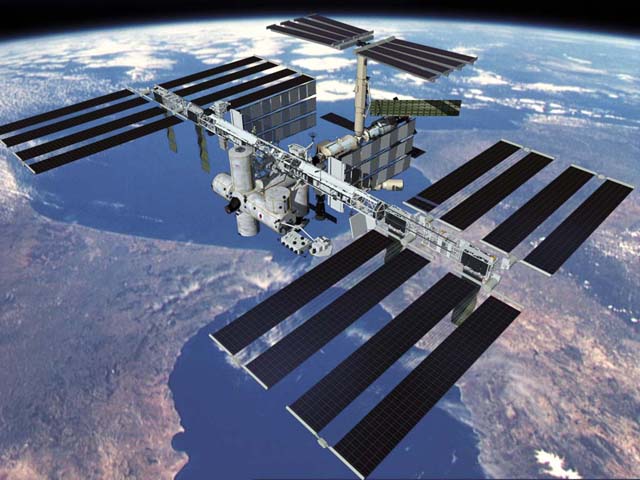NASA has just released its 2012 budget request. We knew it wasn't going to be pretty.
From a very quick perusal, here's what it looks like. The centerpiece of the 2012 budget is the International Space Station. I could almost end this post with that, and you'd get the idea. But, there are some other points of interest.
Maintaining the ISS is the biggest single item on the list. They spent an awful lot of ink justifying that one. It's a good program, and relatively inexpensive to maintain at this point. But at this moment it's the sexiest thing NASA has to offer the general public, and that's not great. Once the Space Shuttles are retired later this year, to get to the ISS we'll either hitch a ride with the Russians, or make our astronauts fly coach on Virgin Galactic. At least if they fly with Sir Richard they'll have funky purple lighting, techno music, cool safety videos, personal entertainment systems and pretty decent food while they rack up those frequent-flier miles to use on lower altitude Virgin flights.
Continued exploration of the Moon and Mars, with the long-term goal of colonizing both of them, are also a high priority in this new budget. I think that the possibility that we'll have a colony in the moon's Peary Crater within my lifetime is now pretty good. I don't expect to see a colony on Mars within my lifetime, but my daughters may see it within theirs. If outmigration is the main goal (and it's not an unreasonable one) a larger low-orbital space station might have been cheaper. But it would have been harder to justify, given that we already have the ISS.
Continued focus on earth sciences, such as global warming, and on solar weather. All of these are necessary and good.
The James Webb Space Telescope, even though it's already well over budget, survived the cuts. I think Hubble made a believer out of people. I'm really glad JWST survived, I had serious doubts.
There's still funding for Near Earth Object tracking and research. I figured that one was safe. Almost everyone can figure out the cost-benefit analysis of knowing if a large asteroid is on its way.
Other than Mars, most of the planetary exploration has been cut. JUNO will still fly to Jupiter, simply because they've already spent so much on it. But the proposed missions to Europa and the other Galilean moons, and to Titan and Enceladus, have all been de-funded. This isn't surprising. Taxpayers generally fall into two categories; those who have never heard of Europa, and those who are terrified that we'll find life there which wasn't mentioned in some bronze-age religious text or another. Either way, most Americans aren't that interested in going there. Maybe Europe, India or China will get there in the next decade or so. NASA won't.
Low-budget heavy lift, using cannibalized parts from the space shuttles and the Constellation project, was authorized to be fully operational by 2016. See the recent post here on big dumb booster technology. I'm happy about this: I've been a fan of BDB for years, and the US is long overdue to start exploring space on-the-cheap. I'm a little surprised that they didn't also grant more funding for solar sail technology for the same reason, but they didn't, so far as I could tell.
Not surprisingly, exploratory funding for Project Orion was cut, again. I'm a huge proponent of Orion, but I'm not too sad that it was cut from NASA's budget this year. I think that particular djinni is out of the bottle now, and if NASA doesn't build it, somebody else will (c'mon Mr Branson, you know you want to do it before Bezos does!). But for the moment, for better or worse, it looks like the moon and Mars, slow and cheap but with the intention of staying, are NASA's new goals.
Here's the whole budget.

By the way, the previous unsolicited and unpaid promo for Virgin Fillintheblank was quite sincere. I just flew Virgin America for the first time last week, from Seattle to Orlando. I'm very, very impressed. And I'm hoping that over the next year or so I can rack up enough frequent flier miles of my own to score a free ride to the International Space Station. ;D
ReplyDeleteThis is great, and thanks for linking to the budget. I'm a little surprised, though perhaps I shouldn't be, that plans for human colonization and manned spaceflight have stronger support than robotic proposals. What made NASA not plan to have a shuttle replacement ready to go? I wonder how it will work for NASA to send astronauts to the other side of the globe to hitch a ride to the space station...
ReplyDeleteThe thing is, NASA DID plan to have a replacement for the space shuttles. Constellation was meant to do that as well as provide heavy lift to the moon, Mars and beyond. The 2010-2011 budgets scrapped Constellation because it was way over budget and way behind schedule. Congress and the Obama administration felt that commercial ventures could do that work better, allowing NASA to focus on deep space exploration instead. Which was an excellent idea, even though it was unpopular. This budget is basically a 180° turn-around, and now they're scrubbing the deep space exploration in favor of reconstructing the Bush-era moon and Mars programs. And telling NASA to completely rethink 60 years of heavy-lift philosophy in favor of a BDB program. I happen to agree with this, but it would have been much cheaper in the end if they had just been allowed to continue with Constellation, if that was the direction NASA was going to be told to go. I feel bad for NASA, Congress has had them chasing their own tail ever since Apollo.
ReplyDelete